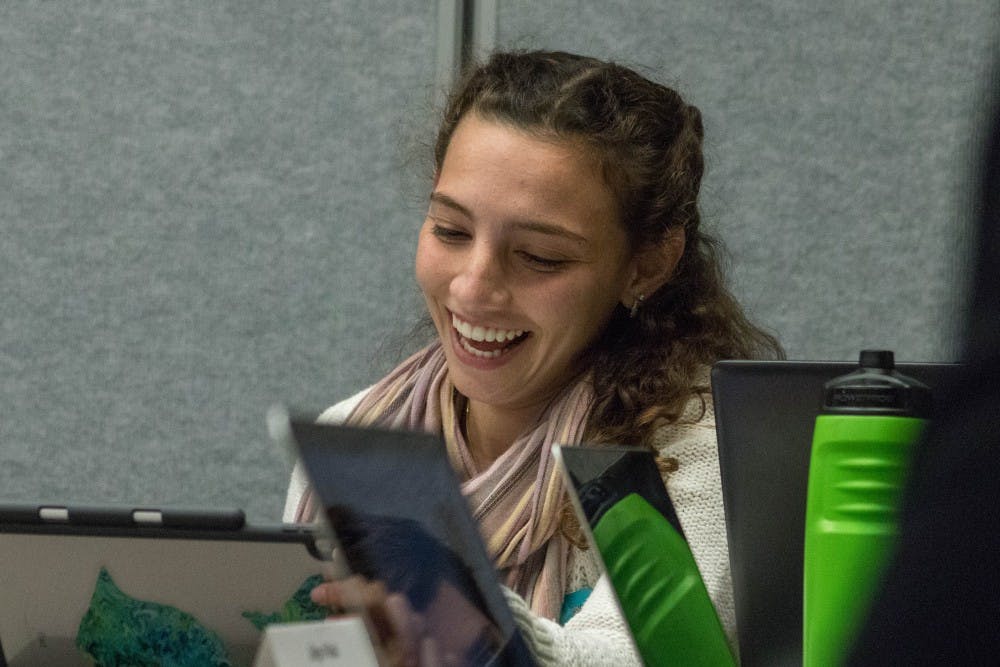Working with Michigan State's newly appointed interim president, a program that trains college women to run for student government and a previously vetoed bill were discussed at the Associated Students of Michigan State University, or ASMSU's first general assembly meeting of the semester.
Here are three takeaways from the Jan. 17 meeting.
Working with Engler's replacement
The meeting started off with the Office of the President highlighting ASMSU's accomplishments from the fall semester, while also expressing optimism for the organization's upcoming semester.
Following former Interim President John Engler's Wednesday resignation, former dean Satish Udpa was appointed in his place. ASMSU briefly addressed working with MSU’s new interim president.
ASMSU President Cookie Rifiotis shared a conversation she had with Udpa just before he took the position.
“Right after the announcement that he was going to take this new role, he made a point to come up to me, shake my hand and say, ‘I’m really really excited to work with students,’" Rifiotis said.
After Rifiotis thanked him, Udpa reiterated his excitement and intent to work with the student body.
"That emphasis on the commitment is very hopeful, and I hope that we can all embrace him and work together to bring Michigan State University to its excellence of integrity and respect that we all expect,” Rifiotis said.
"ElectHer" bill passes after long discussion and debate
After passing through last week's committee meetings, a bill allocating $4,000 to bring the ElectHer seminar — a program that helps encourage and prepare college women to run for student government on their university campuses — to MSU was presented to the general assembly.
The assembly voted to increase the allocation amount from $4,000 to $5,000 with a vote of 31 to 2 to 1. Later, the assembly passed the bill with a vote of 31 to 0 to 2.
However, the passing of the bill did not come without significant discussion before voting.
College of Agriculture and Natural Resources representative Sergei Kelley initiated the discussion by voicing his disapproval of the bill. He said the student government should instead push for an all-inclusive seminar.
“ElectHer calls for the need for more women to be in ASMSU, but statistically based on the demographic report from this year and last year and (the) Office of Registrar of MSU they are not under-represented,” Kelley said. “What we need is equal opportunity, not equal outcome.”
After several comments were made by other representatives attempting to shut down Kelley’s suggestion for an all-inclusive rather than woman-oriented seminar, Vice President for Academic Affairs Dylan Westrin brought order back to the meeting.
“I don’t want this body to lose itself in an argument surrounding ideology or political viewpoints and make this about us versus them, it’s not that. ElectHer has never been about that and it never will be about that," Westrin said. "This is about empowerment across all sorts of constituent groups and all sorts of political viewpoints and it's not just about politics, it's not just about government or here on campus — it's about careers."
Westrin then elaborated on his support of the bill.
“It means a lot to sit in a room and see someone who looks like you in a position of power and think to yourself, ‘wow I can get there,’” Westrin said. “I think ElectHer is a way for someone to start getting there.”
Kelley responded by continuing to express his belief in the positive impact of a seminar advertised to everyone, not just women. He described his reasoning being that ASMSU should “not fight alleged discrimination with alleged discrimination.”
Support student media!
Please consider donating to The State News and help fund the future of journalism.
Shortly following Kelley’s final comment, the assembly voted to pass the bill. ElectHer will come to MSU on Feb. 23.
Addressing bills vetoed during exam week
At the end of last semester, Vice President for Finance and Operations Dan Iancio — who stepped in for Rifiotis when she took a personal leave of absence — vetoed two bills. The presidential veto had only been used twice before.
One of the vetoed bills, which was created as a result of "the lack of strong, positive relations between students and the MSUPD," was met with concern from members of the Council of Racial and Ethnic Students, or CORES, and the Council of Progressive Students, or COPS, at the meeting.
The assembly decided to send the "community policing" bill back to the policy committee for further discussion — which was originally the plan before it was voted on and vetoed at the previous meeting.
“The idea at that meeting was that we were going to refer the bill back to policy so that we could radically rewrite it with those voices in mind," Policy Committee Chair Isaiah Hawkins said. "However, because it was a long meeting and due to other procedures, the bill eventually got passed over the objections."
Following that meeting, Hawkins and Iancio met. Ultimately, Iancio vetoed the bill that day because the two felt that it “did not reflect our students.”
However, at Thursday's meeting, Hawkins brought the bill back onto the table, suggesting the assembly send it back to policy committee for revision and review.
President of the Asian Pacific American Organization Quynh Hoang was one of those who did not support the bill.
“I felt like a lot of times bills in ASMSU aren't discussed with CORES and COPS, and I felt like the community policing bill didn't take that into consideration,” Hoang said. “What I heard the last time was that people wanted more police officers in their uniforms, in front of students in their residence halls and dining rooms, just everywhere and I felt like that is just putting students in danger just because they don't feel safe.”
The next committee meetings will be held on Jan. 24.
Discussion
Share and discuss “New interim president, vetoed bills and more addressed at ASMSU meeting” on social media.








